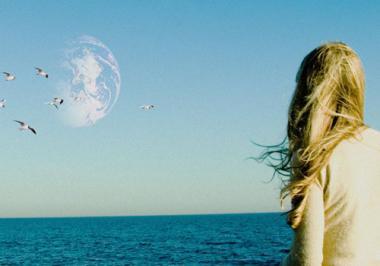Live long enough, and the phrase “the end of an era” begins to look less and less like an empty clich? and more like something one should really reserve for the right occasion. It’s the grandmother’s silver of aphorisms, kept tucked away until the moment strikes.
It struck for me last month, when on July 21st the final space shuttle mission (STS-135, for those keeping track) came to a quiet end with the shuttle Atlantis rolling slowly to a stop at Florida’s Kennedy Space Center. That was the final act in a 30-year drama that kicked off the week I turned eight years old; over those three decades the triumphs and tragedies of the shuttle program instilled in me a sense of wonder about the cosmos that has never gone away.
That nagging, human curiosity about what’s “out there” is a part of what makes Another Earth, screening now at Amherst Cinema, so enticing. This low-budget film, shot and edited by director Mike Cahill and co-written with leading actress Brit Marling, presents a new and audacious reality: one day, when its characters look up into the sky, they see not the moon but a second Earth hanging heavy in the sky.
For young astrophysics student Rhoda Williams (Marling), it’s the thrill of a lifetime—until, in her enthusiasm to catch a glimpse of this new world, she causes a fatal accident. Locked away for the next four years, she emerges from prison just as composer John Burroughs (William Mapother; LOST) emerges from the coma caused by Williams’ negligence. Guilt-ridden, Williams shows up on Burroughs’ doorstep, and—without revealing the depth of their connection—begins to build a relationship with the man whose life she shattered.
In the meantime, there is still the matter of that other Earth. As it happens, it’s not just a duplicate of our planet, but of all of us—as though it were less a copy than a second original, living in parallel to us all along and only now revealed to the naked eye. It turns out that there are space aliens, and it seems that they are us.
As Williams and Burroughs learn more about each other, a new opportunity arises: a corporation on (our) Earth sponsors a contest, the winner of which will be given the opportunity to travel to the second Earth. What might a visitor find in such a familiar place, the movie wants us to wonder. A family, whole again, no longer devastated by grief? A young woman whose life never lead, inexorably, to the focal point of a catastrophe? And more importantly: are those questions we can—or should—ever know?
Despite its title, The Future, now screening at Pleasant Street Theater, has a decidedly lesser sci-fi feel. Instead, the new film from multimedia artist Miranda July (Me and You and Everyone We Know) focuses on a 30-something couple (July and Hamish Linklater) who, after adopting a kitten in distress, realize that their lives haven’t played out exactly as they planned. Sparked to make changes, they decide to dedicate themselves to their dreams during the cat’s month-long convalescence. July’s steadfast idiosyncrasy as a writer and director ensures that, as in her characters’ lives, nothing will turn out to be as easy as you think.
*
Also this week: a few notes on special screenings. Amherst continues its Humphrey Bogart festival with shows of The African Queen on Sunday and Wednesday—Bogie won an Oscar for his turn as a liquored up WWI-era boat captain. Katherine Hepburn co-stars as the woman slowly warming to his ways. Check back next week for news of a new series coming to sister cinema Pleasant Street Theater. To while away the time until then, fans of Al Pacino’s unique brand of acting will want to catch Scarface when it comes to Cinemark on Wednesday night. There we’ll see if a screen has been made that can contain his Tony Montana.
Jack Brown can be reached at cinemadope@gmail.com.



